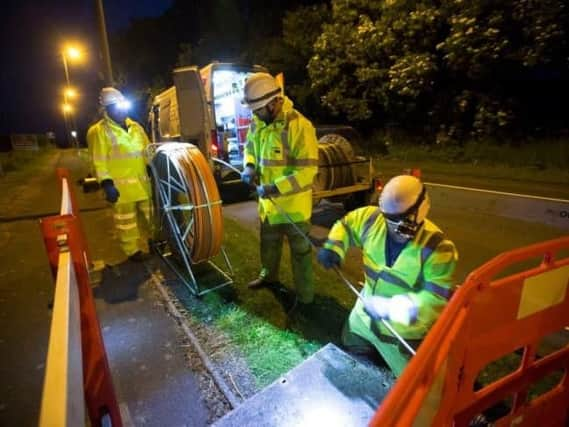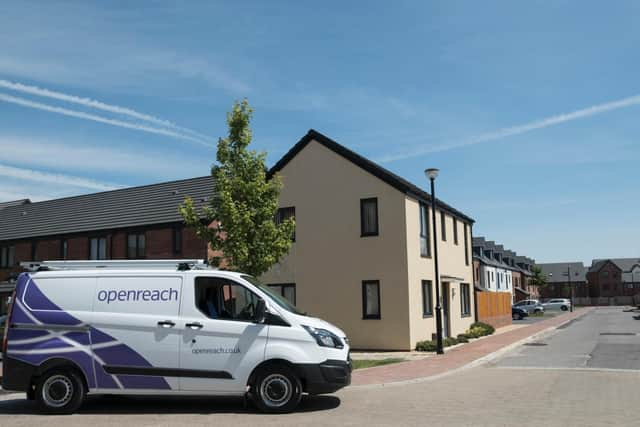Broadband firms rapped and fined for worsening roadworks


Angus Carmichael said he was "extremely disappointed" the firm's performance had got worse in 2015 despite being fined a total of £68,500 in 2012 and 2014.
Openreach said after being fined £38,500 in 2012 that it believed its performance had improved and was increasing efforts "to ensure work meets or exceeds the necessary standards”.The commissioner also fined Virgin Media £16,000, Telefonica £8,000, Vodafone £8,000 and Energetics £1,500.
Advertisement
Hide AdAdvertisement
Hide AdHe estimated they were collectively responsible for a "completely unacceptable" 12,229 botched roadworks in 2015.


The companies failed to use the correct materials, to the correct depths and compaction levels, when filling in holes after laying pipes and cables.
Mr Carmichael said: “Compliance with these duties is essential to protect the road network across Scotland.
Advertisement
Hide AdAdvertisement
Hide Ad"Failed reinstatements reduce the serviceable life of the road, leading to further road works to replace the failed sections, additional costs to roads authorities and unnecessary disruption and inconvenience to road users.


“I am extremely disappointed that the performance of a number of utility companies has declined since the previous National Coring Programme [checks].
"In particular, companies operating in the telecommunications sector, and specifically Openreach, who were penalised £38,500 in 2012 and £30,000 in 2014 for similar failings.
"Despite ongoing engagement with senior management in Openreach, performance has deteriorated from a pass rate of 72 per cent to 69 per cent.
Advertisement
Hide AdAdvertisement
Hide Ad"In view of their continuing poor performance, which demonstrates no improvement, I have no option other than to apply the maximum penalty available to me of £50,000.
"Virgin Media, who were penalised at a failure rate of 63 per cent in 2012, improved their performance significantly to 86 per cent in 2014, but have fallen to 76 per cent in the latest programme.
"The performance of Vodafone, Telefonica and Energetics is also unacceptable and in need of early improvement."
Mr Carmichael said by comparison, major water, gas and electricity firms achieved pass rates of some 90 per cent, "demonstrating that improvement is possible and can be maintained".
Advertisement
Hide AdAdvertisement
Hide AdHe said: "In 2015, road works undertaken across Scotland by these failing companies totalled 40,764 against 96,243 utility company road works registered.
"At an average failure rate of 30 per cent of 40,764, this suggests the legacy left by the five companies penalised totals 12,229 failed reinstatements.
"This is completely unacceptable and I hope these penalties serve as a clear warning to organisations."
An Openreach spokesperson said: “We’re sorry our roadworks haven’t been up to scratch and we’re working hard to improve.
Advertisement
Hide AdAdvertisement
Hide Ad"We’re being fined for works which took place back in 2015 and we’ve since appointed a new contractor for our civils work.
"We currently have the largest number of civils operatives we’ve ever deployed in Scotland to help deliver high-speed broadband services to the most far-reaching and difficult terrain.
"While we expect high levels of civil works to continue in the next 12 months, we’re 100 per cent committed to delivering quality reinstatements.
"We’re working closely with the commissioner and our contractors on our improvement plans, and putting actions in place with all our operational teams and suppliers to make sure we deliver better results.”
Advertisement
Hide AdAdvertisement
Hide AdHowever, Openreach said in 2012 after being one of the first firms to be fined by the commissioner: "We believe our performance has improved and are increasing our efforts, in collaboration with our contractors, to ensure work on our behalf meets or exceeds the necessary standards.”
Neil Greig, the Scottish-based policy and research director of motoring group IAM RoadSmart, said: “We are worried an upward trend in fines really means a downward trend in standards creating long-term problems under our road surfaces.
"The key is to have a system that penalises the worst offenders but also encourages improvements in training and management of road openings.
"We also want to ensure mistakes made today will still be the responsibility of those who made them ten years down the line when the cost of repairs are much higher.
"If that long term link is not made then councils will end up paying out even more, which will further hold up efforts to bring down the backlog of general repairs.”